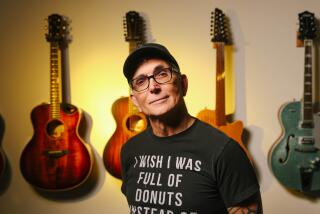Lawrence Welk, Popular TV Bandleader, Dies at 89 : Entertainer: His ‘champagne music’ program ran for 27 years.
- Share via
Lawrence Welk, a firm taskmaster and consummate businessman whose “champagne music” was welcomed into the living rooms of Middle America on Saturday nights for an unprecedented 27 years--the longest-running prime-time musical program in television history--has died, it was reported Monday.
Bernice McGeehan, a spokeswoman for the Welk organization, said he was 89 when he died at his Santa Monica home Sunday night of pneumonia.
“He really died peacefully,” with family members at his side, she said.
Welk was a reluctant farm boy who left his home near Strasburg, N.D., when he turned 21 for a career as an itinerant accordionist.
Welk, whose bubbling music makers were a television staple for 40 years, made his debut in an era when Arthur Godfrey, Groucho Marx, George Burns and Gracie Allen, Kukla, Fran and Ollie and Jackie Gleason’s “Honeymooners” were at the top of the Nielsen ratings. And he outlasted them all. Welk to this day can be heard cuing his band with his “uh-one and uh-two” signature countdown on weekly rebroadcasts of his television shows on PBS outlets throughout the country. They are reported to be No. 1 in the PBS rankings.
Welk was never an innovator. His criterion for success was to keep it sweet and simple: Play the proven standards the people want to hear, in the simplest of arrangements, and in less than three minutes just in case someone did not like a particular song. It was safe-and-sane TV entertainment, predictable and stable and wholesome.
For that, he went virtually without praise from within the television industry. His reward came from his audiences, who could not wait to hear a succession of “Champagne Ladies,” accordionists and talented instrumentalists often forced to submerge their abilities in the routine Welk arrangements.
Some ultimately grew frustrated by his methods, which included control over music and even costume selection. Many quit.
Alice Lon and the Lennon Sisters were two examples.
Lon was one of the television Champagne Ladies, the showcased singers intended to symbolize the essence of femininity. But she left the show in 1959 after a lingering feud over her desire for more variety on her musical menu and--more sensationally at the time--after a dispute over the length of her hemlines, which were rising, along with Welk’s chagrin.
“There was a dress code that everyone had to live up to,” said Sam Lutz, Welk’s long-time manager, “ . . . and that got to be a problem when he started working with a younger generation of people in the music business.”
The singing Lennon Sisters--Janet, Kathy, Peggy and Dianne--said later that they felt working for Welk put them in a time warp.
“As we got older--into our teen-age years and then into our 20s--we wanted to do more sophisticated, more popular music,” said Kathy Lennon, who was 12 when she and her sisters joined the show in 1955. “But Mr. Welk frowned on that. He wanted to give people music he thought they could understand, and he didn’t think they could understand Beatles songs or Stevie Wonder songs.”
The Lennons left Welk in 1968, to the bandleader’s dismay.
As with Lon, costumes also were a point of contention with the Lennons.
Kathy Lennon recalled the time the sisters insisted on wearing bathing suits--albeit modest, one-piece suits--for a pool scene taped at Welk’s resort near Escondido.
“Mr. Welk got more letters than you could believe afterwards from people asking him how he could have allowed our legs to be shown on television,” Lennon said. “He came to us with those letters and said, ‘I told you!’ And he told the wardrobe people never to put us in bathing suits again.” “That’s what kept Lawrence Welk on television for so many years. He listened to his audience,” Lennon said.
Still others left the show over money disputes with Welk, who paid the minimum union scale to his cast. “We worked at group scale, which was $110 a week, for 10 years,” Kathy Lennon recalled. “After that he agreed to pay us solo scale, $210 a week. That’s what we finished out at. When we told him we’d stay if he’d pay us double scale, he told us, ‘No act is worth a penny over scale to me.’ ”
Still, most of the crew hung around. “For one thing, there was no other place where a musician could get such a steady job,” said one cast member.
Welk did set up a generous profit-sharing plan for his performers while giving them freedom to appear on other television shows and to make personal appearances.
Not many, however, found extensive work outside of the Welk show. For one thing, they all had to be at the studio for the Saturday night show--the biggest night of the week for personal appearances.
Welk was an unlikely candidate for national fame, but parlayed the German accent he picked up from his immigrant parents, charisma and a keen discernment of Middle America’s musical taste into a business empire founded on television, records and music publishing. At first uneasy as a television personality, fearful that his fourth-grade education would betray him, he soon enough developed a love affair with his audiences.
He was ever gracious to his fans and was the proud patriarch of his so-called musical family of studio musicians, dancers, singers, entertainers and support crew members, serving as a gentle but firm disciplinarian and preacher of conservative values.
If Welk played to the older generation, he was perhaps most pleased by the reception he received from younger listeners.
Welk recalled in a 1978 interview with The Times how he once was spotted at a coffee shop in Macksville, Kan., and asked to make an unscheduled appearance at the town’s combined elementary and high school.
“That was the biggest applause I ever had,” he said. “I stayed for a half an hour and played the accordion. It was the highlight of my life.”
Still, Welk understood his primary market and played to it like the maestro he was.
In one of his seven books, “You’re Never Too Young,” Welk told of a time he toyed with his tried-and-proven hotel ballroom road show.
“A road-show audience is an instant barometer,” he wrote. “I can tell by the sound and amount of applause--or lack of it--just what it is an audience likes. A quiet audience just kills me.”
The sixth of eight children, Welk was born in a sod house in North Dakota. His first musical instrument was a violin he fashioned from an old box and strands of horsehair when he was 3 years old. He graduated to his father’s accordion, and in short order wanted to buy his own.
At age 17, he struck a deal with his father, Ludwig. He agreed to work on the family farm until he was 21, and turn over all the money he made by performing at social functions, playing his own prized $400 accordion.
On his 21st birthday, Welk left home and spent the next year or so living in motel rooms and in the back of touring cars as he and other itinerant musicians formed pickup groups to play in town squares and social halls.
In 1925, Welk joined a group called George T. Kelly’s Peerless Entertainers and was billed as the “world’s greatest accordionist.” Two years later, he formed his own band and began playing on the radio in Yankton, S.D.
During the 1930s, Welk’s band grew to 10 pieces and was known for a time as the Hotsy Totsy Boys. They began settling into hotel ballroom work. It was in Pittsburgh, where his shows were played on the radio, that Welk’s music was described as light and frothy--like champagne.
Welk did not miss a beat, changing the name of his show to “The Champagne Music of Lawrence Welk.” Singer Lois Best became his first Champagne Lady, and the musicians became champagne music makers.
Lutz, Welk’s manager, recalled that it was not until the mid-1940s that Welk finally began to speak freely to his audiences, a reflection of his insecurity with his accent.
“A manager at one of the theaters in Milwaukee asked Lawrence to do the announcing for the show. Lawrence said, ‘I can’t do it. I don’t speak well.’ The manager said, ‘If you talk, I’ll give you $100 more.’ ‘For $100 more, I’ll talk.’ That’s when Lawrence started getting into it,” Lutz said.
Welk’s band was headquartered in Chicago during the 1940s, but continued with road shows that ultimately took him in 1951 to Santa Monica’s Aragon Ballroom.
TV station KTLA Channel 5 broadcast an early performance. “As I recall, the show was nothing really special,” Welk wrote in his autobiography, “Wunnerful, Wunnerful.” “We played our usual arrangements for the dancers. I danced with some of the ladies and joked with the guests.”
But Welk received an immediate favorable response from viewers. “I had a flash of insight, an absolutely firm feeling that the boys and I had ‘come home,’ and that television was the thing we had been looking for. I went home and said to Fern (his wife), ‘I think we’ve finally found our place in life.’ ”
In 1956, ABC-TV broadcast Welk from coast to coast, and over 16 years the Welk show missed only one week--in the aftermath of the assassination of President John F. Kennedy in 1963.
ABC dropped the show in 1971, deciding Welk’s audience was too old to attract sponsors looking for a more youthful and affluent market. His sponsors at the time reflected Welk’s demographics: Geritol and Sominex.
Welk responded by syndicating his show, which ultimately was picked up by more than 250 stations around the country--more than had aired his show on ABC.
The program did not miss a week of air time until weekly production ended in 1982.
Ultimately it proved to be the show that would not go away. A PBS documentary in March, 1987, on Welk’s life--with Kathy Lennon as host--received such good viewer response and fund-raising pledges that two years of reruns were syndicated. They appear now on more than 240 public television stations.
Welk spokeswoman McGeehan said Monday that the reruns will continue at least through 1994.
Welk’s company, Teleklew Inc., deals in music publishing, recordings and real estate, including hundreds of acres of residential investment property north of Escondido, a mobile home park near Palm Springs and an office and apartment complex in Santa Monica. Lawrence Welk Jr., the eldest child, is company president.
In recent years, Welk and his wife of 61 years spent their retirement primarily at their “Champagne Towers” in Santa Monica. The couple, however, frequently lived at their second home in Bonsall near Escondido. It was in Escondido that Welk turned another small trailer park into a successful, upscale mobile home park and vacation resort.
A museum and theater built there in his honor attract busloads of tourists.
In addition to his wife and son, he is survived by two daughters, 10 grandchildren and a great-granddaughter. Funeral services will be private.
More to Read
The complete guide to home viewing
Get Screen Gab for everything about the TV shows and streaming movies everyone’s talking about.
You may occasionally receive promotional content from the Los Angeles Times.






